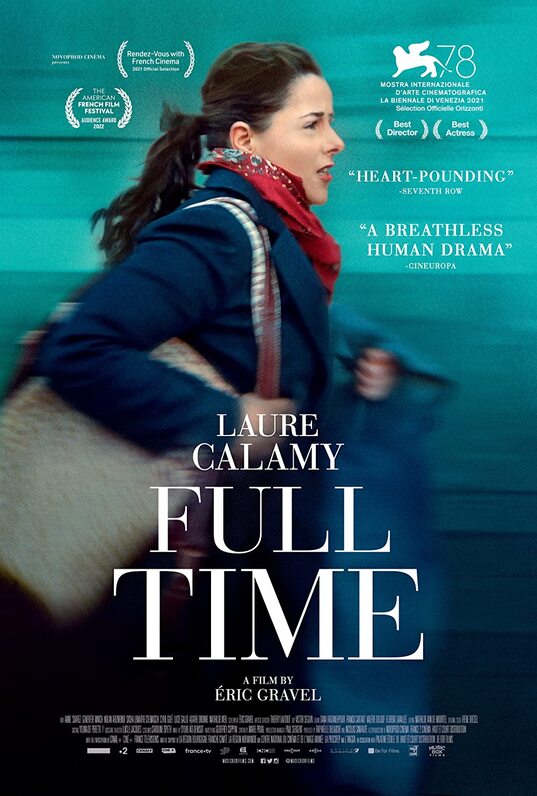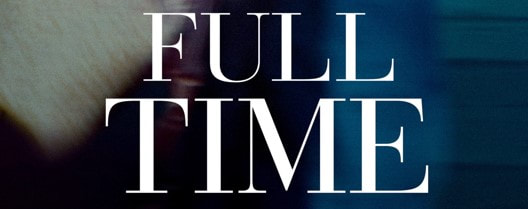CAST & CREW
Directed by Eric Gravel
Featuring Laure Calamy, Agathe Dronne, Anne Suarez
In French with English subtitles
Rating: Not Rated
Runtime: 87 min
Directed by Eric Gravel
Featuring Laure Calamy, Agathe Dronne, Anne Suarez
In French with English subtitles
Rating: Not Rated
Runtime: 87 min

Reviewed by Peter Sobczynski | RogerEbert.com
Éric Gravel’s “Full Time” follows an ordinary working-class person as they attempt to keep their head above water in a society that seems set up to ensure they will fail at said task. This is the kind of narrative the Dardennes brothers have made a specialty out of in recent years, but here it's done with breakneck pacing that will remind viewers of the similarly headlong “Run Lola Run” while leaving them almost as exhausted as its central character by the time it is all over. Though these two concepts may sound wildly incompatible, "Full Time" looks and sounds like a nail-biting thriller and tells a story that many viewers will be able to relate to on an intensely personal level.
The film’s protagonist is Julie (Laure Calamy), a single mother of two kids. She lives in the suburbs of Paris but commutes into the city for her job as the head chambermaid of a swanky four-star hotel. For her, this is not the ideal situation—she's struggling to make ends meet while waiting for her ex to pay alimony and the nanny (Madame Lusigny) who watches her kids ends up seeing more of them than she does. However, there's one bright light on the horizon in the form of a job opening at a marketing firm that would be a much better fit for her skill set than her current occupation. Getting to the job interview without her supervisor knowing her intentions will require some iffy behavior, including coaxing coworkers to risk their jobs by covering for her. In this case, she figures the risk is worth the reward.
The problem is that Julie is totally dependent on public transportation to get her to and from work. As anyone in the same circumstance can attest, many things can happen with public transit that are theoretically out of your hands but still have enormous repercussions on one’s livelihood. In Julie’s case, a week that's already going to be hectic because of the job interview becomes even more so when a citywide transit strike is called—although she barely seems to pay it any mind when it's being discussed on the news, the reality of its impact hits as the simple act of getting to work, let alone on time, becomes only slightly less fraught than the truck journey in “Sorcerer.” Despite the city being brought to a near-standstill, Julie goes to extraordinary lengths to try to make it work—rushing from one transit terminal to another in the hopes of finding a still-running train or bus, hitchhiking, or using her rapidly dwindling funds to pay for a van rental or a jacked-up cab fare. But she can only keep her metaphorical plates spinning for so long before the inevitable crash.
The notion of applying an action film feel to someone going about their daily routine may seem a bit precious, perhaps even contrived, but it is a conceit that Gravel is able to pay off effectively. From a technical standpoint, the construction of the film is very impressive as both Mathilde Van de Moortel’s editing and Irene Dresel’s score (both of whom received Cesar nominations for their efforts) give the film a sense of real tension right from the get-go and sustains it until the end—even the rare moments when Julie can steal a minute for herself are hardly a respite as we can sense how guilty she feels for even those all-too-brief bits of calm. And while it may sound like a gimmick, anyone who has ever raced to catch the bus to work as it's about to pull away from the stop or has waited on the platform for a late train will easily recognize Julie's pulse-pounding feelings.
At the same time, the film is careful not to completely let her off the hook either, whether in regards to her stubborn determination to be employed in the city despite a horrific commute (in order to live up to her dreams of upward mobility), or her general lack of concern for the motives behind the strike in general, or how her efforts negatively impact everyone from her children to her overtaxed nanny to co-workers who wind up paying the price for her behavior. Although her efforts to better herself are admirable, the same cannot always be said for Julie. It is to the credit of both Gravel’s screenplay and Calamy's performance (which both also received Cesar nominations) that they are willing to paint her as a recognizably flawed human being, and not some kind of cruelly oppressed saint.
“Full Time” does have a couple of problems it doesn’t quite manage to work around. While it's a key plot point that Julie never displays any significant curiosity about the strike that affects her life so profoundly, the film likewise doesn’t seem to have much to say about organized labor, the conditions that would lead to such a paralyzing strike, or whether it's in favor of such actions or not. As a result, the final moments in which Gravel tries to wrap up his story prove unsatisfying when all is said and done. For the most part, however, “Full Time” is an intelligent and mostly engrossing movie about a situation that will seem all too familiar to many. Gravel's film unites quietly observed humanism and palpable tension and somehow makes it work.
= = = = =
MOVIES
‘Full Time’ review: In this high-velocity thriller, the only crime is a working mother’s work week
Reviewed by Michael Phillips | Chicago Tribune
Built for nerve-wracking speed, the French import “Full Time” is scored musically like a Luc Besson thriller from the mid-’80s, jacking up the tension with synthesizer beats suggesting the heroine is headed for a run-in with hordes of assassins.
But no. The enemy in this ground-level, working-class thriller is time, with an assist from relentless labor practices; a crippling series of Parisian strikes messing up everyone’s commutes; and the challenges of childcare for working parents trying to hang onto their job as well as their sanity. If you thought Season 1 of “The Bear” was tense, “Full Time” makes “The Bear” look like “March of the Penguins.”
A Music Box Films acquisition opening Friday at the Music Box Theatre, writer-director Eric Gravel’s week-in-the-life exercise in suspense begins with darkness and the sound of a woman, breathing, as if she’d just run a marathon. In truth she’s asleep, about to be awakened by her cellphone alarm, for another day of just-in-time management.
Julie is head chambermaid at a five-star hotel in Paris. She and her two children live in a village some distance outside the city center; for this single parent, it’s a tight commute even in favorable circumstances, and in “Full Time,” even with its moments of humane sympathy, favorable circumstances are hard to come by.
Labor strikes have hobbled the transit system. As Julie — played by the marvelous Laure Calamy of “Call My Agent” — drops her kids at the home of their aging, increasingly exasperated nanny, it’s as dark outside as it is when her day is through.
At the hotel Julie oversees a whirl of controlled chaos in a caste system determined by the demands of Platinum-level guests. She trains dubious new hires when she isn’t power-washing one room’s bathroom walls after an (off-screen) incident of feces-smearing. Meantime she’s angling on the sly for a job interview elsewhere.
Julie has market-research experience in her past, and a corporate job prospect in her near-future, but the world conspires against her every tightly packed minute. As she changes the sheets in posh suites named after pillars of democracy — the Jefferson suite, the Roosevelt suite — “Full Time” revels in the hurtling pace and crisply edited momentum of a life that could use a little more freedom, and fairness, and a little less velocity.
Comparisons have been made to the films of the Dardennes brothers, which seem a little off to me. While their stories of ordinary women and men living, precariously, have an assured way of working up a sweat on any viewer’s brow, the Dardennes steer clear of atmospheric flourishes most films, this one included, take for granted. “Full Time” is closer in rhythmic spirit to the hit German film “Run Lola Run” from a generation ago, though without its overt crime elements.
The story resolution feels a lot less truer than what comes before it. I suppose it’s necessary for a movie like “Full Time” to land its protagonist on a soft bed of redemption and relief after such a rough ride. But in movies as far-flung as “Full Time” and the Andrea Riseborough vehicle “To Leslie,” the narrative convenience limits the narrative effectiveness.
In this case, though, only a bit. This is strong and highly economical storytelling, clocking in at under 90 minutes. Calamy is terrific, creating a whole character out of beautifully observed behavior. This is a process movie, driven by a first-rate actor deal with every kind of phone call. When she’s not avoiding her mortgage-seeking banker, Julie’s trying to get her ex-husband to cough up overdue alimony. She’s a one-woman coping mechanism, squaring up against a universe of microaggressions. (Her coveted job interview is a brief staredown with the most combative interviewer in France.) The film is a master class in reactivity, and Calamy manages it with perfect dramatic pitch.
Éric Gravel’s “Full Time” follows an ordinary working-class person as they attempt to keep their head above water in a society that seems set up to ensure they will fail at said task. This is the kind of narrative the Dardennes brothers have made a specialty out of in recent years, but here it's done with breakneck pacing that will remind viewers of the similarly headlong “Run Lola Run” while leaving them almost as exhausted as its central character by the time it is all over. Though these two concepts may sound wildly incompatible, "Full Time" looks and sounds like a nail-biting thriller and tells a story that many viewers will be able to relate to on an intensely personal level.
The film’s protagonist is Julie (Laure Calamy), a single mother of two kids. She lives in the suburbs of Paris but commutes into the city for her job as the head chambermaid of a swanky four-star hotel. For her, this is not the ideal situation—she's struggling to make ends meet while waiting for her ex to pay alimony and the nanny (Madame Lusigny) who watches her kids ends up seeing more of them than she does. However, there's one bright light on the horizon in the form of a job opening at a marketing firm that would be a much better fit for her skill set than her current occupation. Getting to the job interview without her supervisor knowing her intentions will require some iffy behavior, including coaxing coworkers to risk their jobs by covering for her. In this case, she figures the risk is worth the reward.
The problem is that Julie is totally dependent on public transportation to get her to and from work. As anyone in the same circumstance can attest, many things can happen with public transit that are theoretically out of your hands but still have enormous repercussions on one’s livelihood. In Julie’s case, a week that's already going to be hectic because of the job interview becomes even more so when a citywide transit strike is called—although she barely seems to pay it any mind when it's being discussed on the news, the reality of its impact hits as the simple act of getting to work, let alone on time, becomes only slightly less fraught than the truck journey in “Sorcerer.” Despite the city being brought to a near-standstill, Julie goes to extraordinary lengths to try to make it work—rushing from one transit terminal to another in the hopes of finding a still-running train or bus, hitchhiking, or using her rapidly dwindling funds to pay for a van rental or a jacked-up cab fare. But she can only keep her metaphorical plates spinning for so long before the inevitable crash.
The notion of applying an action film feel to someone going about their daily routine may seem a bit precious, perhaps even contrived, but it is a conceit that Gravel is able to pay off effectively. From a technical standpoint, the construction of the film is very impressive as both Mathilde Van de Moortel’s editing and Irene Dresel’s score (both of whom received Cesar nominations for their efforts) give the film a sense of real tension right from the get-go and sustains it until the end—even the rare moments when Julie can steal a minute for herself are hardly a respite as we can sense how guilty she feels for even those all-too-brief bits of calm. And while it may sound like a gimmick, anyone who has ever raced to catch the bus to work as it's about to pull away from the stop or has waited on the platform for a late train will easily recognize Julie's pulse-pounding feelings.
At the same time, the film is careful not to completely let her off the hook either, whether in regards to her stubborn determination to be employed in the city despite a horrific commute (in order to live up to her dreams of upward mobility), or her general lack of concern for the motives behind the strike in general, or how her efforts negatively impact everyone from her children to her overtaxed nanny to co-workers who wind up paying the price for her behavior. Although her efforts to better herself are admirable, the same cannot always be said for Julie. It is to the credit of both Gravel’s screenplay and Calamy's performance (which both also received Cesar nominations) that they are willing to paint her as a recognizably flawed human being, and not some kind of cruelly oppressed saint.
“Full Time” does have a couple of problems it doesn’t quite manage to work around. While it's a key plot point that Julie never displays any significant curiosity about the strike that affects her life so profoundly, the film likewise doesn’t seem to have much to say about organized labor, the conditions that would lead to such a paralyzing strike, or whether it's in favor of such actions or not. As a result, the final moments in which Gravel tries to wrap up his story prove unsatisfying when all is said and done. For the most part, however, “Full Time” is an intelligent and mostly engrossing movie about a situation that will seem all too familiar to many. Gravel's film unites quietly observed humanism and palpable tension and somehow makes it work.
= = = = =
MOVIES
‘Full Time’ review: In this high-velocity thriller, the only crime is a working mother’s work week
Reviewed by Michael Phillips | Chicago Tribune
Built for nerve-wracking speed, the French import “Full Time” is scored musically like a Luc Besson thriller from the mid-’80s, jacking up the tension with synthesizer beats suggesting the heroine is headed for a run-in with hordes of assassins.
But no. The enemy in this ground-level, working-class thriller is time, with an assist from relentless labor practices; a crippling series of Parisian strikes messing up everyone’s commutes; and the challenges of childcare for working parents trying to hang onto their job as well as their sanity. If you thought Season 1 of “The Bear” was tense, “Full Time” makes “The Bear” look like “March of the Penguins.”
A Music Box Films acquisition opening Friday at the Music Box Theatre, writer-director Eric Gravel’s week-in-the-life exercise in suspense begins with darkness and the sound of a woman, breathing, as if she’d just run a marathon. In truth she’s asleep, about to be awakened by her cellphone alarm, for another day of just-in-time management.
Julie is head chambermaid at a five-star hotel in Paris. She and her two children live in a village some distance outside the city center; for this single parent, it’s a tight commute even in favorable circumstances, and in “Full Time,” even with its moments of humane sympathy, favorable circumstances are hard to come by.
Labor strikes have hobbled the transit system. As Julie — played by the marvelous Laure Calamy of “Call My Agent” — drops her kids at the home of their aging, increasingly exasperated nanny, it’s as dark outside as it is when her day is through.
At the hotel Julie oversees a whirl of controlled chaos in a caste system determined by the demands of Platinum-level guests. She trains dubious new hires when she isn’t power-washing one room’s bathroom walls after an (off-screen) incident of feces-smearing. Meantime she’s angling on the sly for a job interview elsewhere.
Julie has market-research experience in her past, and a corporate job prospect in her near-future, but the world conspires against her every tightly packed minute. As she changes the sheets in posh suites named after pillars of democracy — the Jefferson suite, the Roosevelt suite — “Full Time” revels in the hurtling pace and crisply edited momentum of a life that could use a little more freedom, and fairness, and a little less velocity.
Comparisons have been made to the films of the Dardennes brothers, which seem a little off to me. While their stories of ordinary women and men living, precariously, have an assured way of working up a sweat on any viewer’s brow, the Dardennes steer clear of atmospheric flourishes most films, this one included, take for granted. “Full Time” is closer in rhythmic spirit to the hit German film “Run Lola Run” from a generation ago, though without its overt crime elements.
The story resolution feels a lot less truer than what comes before it. I suppose it’s necessary for a movie like “Full Time” to land its protagonist on a soft bed of redemption and relief after such a rough ride. But in movies as far-flung as “Full Time” and the Andrea Riseborough vehicle “To Leslie,” the narrative convenience limits the narrative effectiveness.
In this case, though, only a bit. This is strong and highly economical storytelling, clocking in at under 90 minutes. Calamy is terrific, creating a whole character out of beautifully observed behavior. This is a process movie, driven by a first-rate actor deal with every kind of phone call. When she’s not avoiding her mortgage-seeking banker, Julie’s trying to get her ex-husband to cough up overdue alimony. She’s a one-woman coping mechanism, squaring up against a universe of microaggressions. (Her coveted job interview is a brief staredown with the most combative interviewer in France.) The film is a master class in reactivity, and Calamy manages it with perfect dramatic pitch.
DISCUSSION FOLLOWS EVERY FILM!
$7.00 Members | $11.00 Non-Members
TIVOLI THEATRE
5021 Highland Avenue | Downers Grove, IL
630-968-0219 | classiccinemas.com
We apologize—Movie Pass cannot be used for AHFS programs
$7.00 Members | $11.00 Non-Members
TIVOLI THEATRE
5021 Highland Avenue | Downers Grove, IL
630-968-0219 | classiccinemas.com
We apologize—Movie Pass cannot be used for AHFS programs








